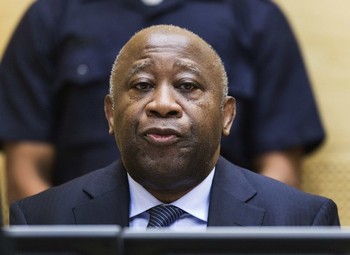UN report highlights link between Sudan’s NCP & Ivory Coast ex-ruling party
April 27, 2013 (WASHINGTON) – A report released by a United Nations commission this week said it has identified thousands of ammunition rounds produced in Sudan that were used by forces loyal to former Ivory Coast president Laurent Gbagbo.

The UN Group of Experts on Ivory Coast listed several instances where traces of Sudan-produced ammunition where found.
“According to information provided by UNOCI [United Nations Operation in Côte d’Ivoire], several tens of thousands of rounds of 7.62 x 39 mm ammunition for assault rifles, with production marks for 2010 and 2011, have been identified. The ammunition and its packaging and markings are consistent with production in the Sudan” the report said.
“This ammunition has been frequently identified in military camps in western Côte d’Ivoire and in weapons collection events relating to the continuing process of disarmament of ex-combatants. On 6 August 2012, UNOCI identified individual rounds of the above-mentioned ammunition at the site of a lethal attack on the Akouedo military camp in Abidjan”.
The raid, which killed at least six soldiers, was the most high-profile in a series of attacks on security installations last year allegedly orchestrated by Gbagbo loyalists based in neighboring Liberia and Ghana.
The panel said that investigations conducted by UNOCI reveal that the ammunition was “probably” destined for pro-Gbagbo forces and trafficked into the country before his capture in April 2011 following French and U.N. intervention in support of fighters backing Ouattara.
Gbagbo was transferred to the International Criminal Court (ICC) in The Hague in November 2011 on crimes against humanity charges, becoming the first former head of state to be taken into the court’s custody.
The report mentions a Memorandum of Understanding (MoU) signed in Khartoum between Sudan’s ruling National Congress Party (NCP) and Gbagbo’s Ivorian Popular Front (FPI) in 2010.
“During the above-mentioned mission, a visit to Sudanese armaments factories took place. The Group cannot rule out the possibility that the visit to the Sudan was closely related to the subsequent discovery in Côte d’Ivoire of Sudanese ammunition manufactured in 2010 and 2011. The Group intends to continue its investigations into this particular case”.
The MoU attached to the report speaks of discussing ” Mutual assistance in case of external foreign interference”; “Security of persons and prevention of violence”; “Security data exchange program”.
FPI ASKS FOR NCP SUPPORT
In the report was a letter from FPI president Pascal Affi N’guessan to then presidential adviser Mustafa Osman Ismail in September 2010 asking for funding to run in the elections.
“As you know, The FPI joined by the Group of 12 Political Parties called “La Majorité Présidentielle” meaning “Presidential Majority” is presently backing President LAURENT GBAGBO for these 2010 elections” the letter reads.
“All the polls produced by independent polls stations have announced President GBAGBO winning at a first turn. Despite that guarantee, we still need to improve the performance of our victory. That’s a best way to facilitate the governance of President GBAGBO during his five years mandate after elections. This is a main reason why we need to continue to recruit more parties and more voters. As you do know, recruiting political parties, right before elections cost a lot and the opposition parties are financed by westerns” N’guessan wrote to Ismail.
“For our Party to fulfill these objectives, we’re seeking for any assistance from His Excellency Honorable President BECHIR. I look forward you assist a delegation of the FPI lead by Dr. Don Mello who is my mandatory to act on my behalf for this specific purposes”.
An affidavit signed by N’guessan gave Mello the mandate to “Negotiate on my behalf, any political and funds raising issues with the National Congress Party of the Republic of Sudan” and “Receive from the National Congress Party any funds as the NCP’s support to the FPI dedicated to the ongoing elections in Côte d’Ivoire”.
There was no indication in the report on the type of help Sudan’s ruling party may have given the FPI.
Sudanese President Omar al-Bashir is also wanted by the ICC on genocide, crimes against humanity and war crimes charges over atrocities committed in the Darfur region. He refused to recognize the court which he calls a western plot to topple him.
During the FPI delegation visit to Khartoum in July 2010, the NCP deputy chairman and presidential assistant Nafie Ali Nafie hailed the Ivory Coast party describing it as one that is “occupied with issues of freedom and security issues in the African continent”.
Nafie further described the FPI as one that “rejects Western control and hegemony and the International Criminal Court as a modern colonial tool” adding that it also supports the unity of Sudan because it is against the partition of the continent.
The FPI delegation on its end told reporters at the time that his party faces conspiracy from Western countries and that it will work with the NCP to guarantee Africa’s unity. It also voiced support to the Sudanese leader against the ICC.
The U.N. Security Council voted this week to extend for one year an arms embargo first imposed on Ivory Coast in 2004.
(ST)
